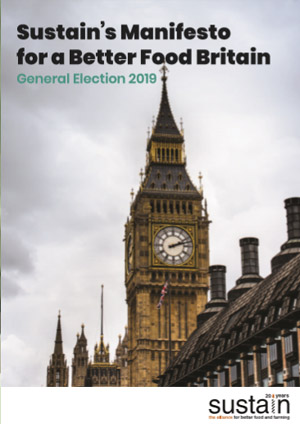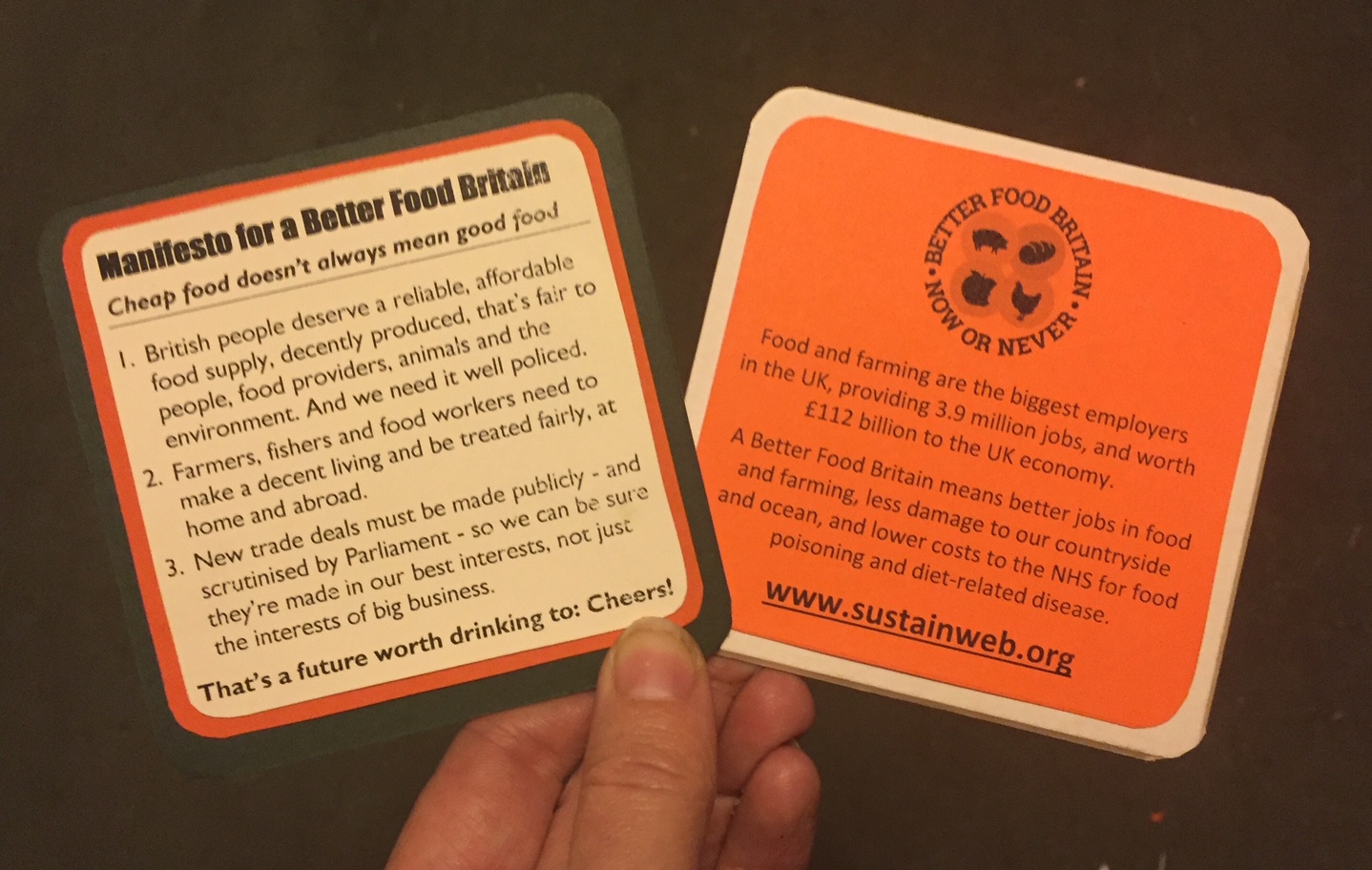 Sustain's Manifesto for a Better Food Britain 2019
Sustain's Manifesto for a Better Food Britain 2019
Our manifesto sets out what we want government and policy makers to do, to secure a Better Food Britain.
Download the 2019 Sustain Manifesto
The General Election to be held on June 8th 2017 will set government priorities for the next five years, with huge implications for the future of the UK’s food, farming and fishing.
The next Government’s five-year term of office will be a period of tremendous upheaval and political change. Take a deep breath. The goalposts will undoubtedly keep on moving, but we know already that the next five years will cover:
- the UK’s negotiation of a new relationship with the European Union, including our trading and tariff arrangements with European countries;
- the UK’s departure from the EU;
- repeal and transposition of European legislation and legal structures;
- establishment of the UK’s new approach to farming and fisheries;
- development of new UK institutional capacity to handle important issues such as food standards, safety, traceability, workers' terms and conditions, and environmental protection;
- introduction of new arrangements for migrant workers, thousands of whom currently work in food, farming and fishing;
- a likely forthcoming referendum for Scottish independence;
- negotiation or early establishment of new international trade deals.
What policies do we want to see, to give our elected representatives the mandate to act, on matters of such gravity? As voters, the decision will shortly be in our hands. So we need to see 2017 General Election party manifestos that set out opportunities for better food, farming and fishing when we start to 'take back control' in March 2019. We also need to see how they will ensure sensible and accountable management of the Brexit process for food, farming and fishing.
The food industry is the biggest employer in the UK, and farming and fishing are fundamental to our economy, our health and well-being, as well as the natural environment. So the General Election Manifestos of the UK’s political parties must set out clearly their approach and priorities for these vital sectors. What the next Government does in the next five years will set the trajectory and legal foundations for the decades to come.

Taking back control of our food, farming and fishing
Importantly, we hope and expect the 2017 General Election party manifestos to set out how the UK will use new post-Brexit freedoms to take back control of our food, farming and fishing. This should include:
- Secure a Fairer, Greener Deal for Farmers: Use farm payments to reward farmers and land managers for protecting our health as well our precious biodiversity and natural assets, such as climate, soil health, pollinators, water and flood protection. Make sure all companies in the supply chain play fair, to support stable trading and decent livelihoods for farmers, at home and abroad, through a time of upheaval – by extending the remit of the Grocery Code Adjudicator.
- Save our Seas by introducing a Sustainable Fisheries Act: Commit to all UK fish stocks (especially the most economically important species) being fished at scientifically agreed sustainable levels, and guarantee to continue the hard-won ban on discarding perfectly edible fish.
- Champion Children’s Health: Reduce sugar in food and drinks, and the promotion and advertising of sugary foods and drinks to children; and guarantee introduction of the promised Soft Drinks Industry Levy. Commit to funding universal infant free school meals, ensuring these are sustainably sourced.
- Guarantee better hospital food for NHS patients and staff by setting hospital food standards in law to ensure fresh, healthy and appetising food is served in hospitals, to limit the hospital retail sale of foods high in fat, salt and sugar, and to support farmers with sustainable food-buying standards.
- Set out a strong government commitment to end hunger in the UK by adopting a robust measure of household food insecurity, reinforcing the safety net and supporting Healthy Start and Holiday Food Provision to help low-income families, as well as meals-on-wheels for house-bound people.
- Promote Good Food Jobs: Defend existing standards (see below) and reinstate the English bargaining body, an Agriculture Welfare and Standards Board, to protect vulnerable farm workers.
- Promote Great British Standards: Enhance the UK’s tradition and reputation for world-leading standards and prevent the UK being drawn into a race to the bottom to weaken food safety and quality, environmental protection, workers’ and consumer rights. We must build confidence, and help British food producers tap into markets for high quality food, at home and abroad.
- Introduce a new Environment Act, as recommended by the Environmental Audit Committee, setting measurable and accountable targets for achieving the current Government's stated ambition to leave the environment in a better state for the next generation.
- Commit to continued promotion of important strategies and plans on which the resilience of our food system depends, and policies to implement them effectively, such as the UK’s Pollinator Plans.
- Maintain and enhance support for organic farming to expand rapidly domestic organic production so that more of UK demand can be met by UK farmers alongside export growth, in recognition of multiple benefits of organic farming methods to wildlife, soil, climate change and animal welfare.
- Commit to effective action to reduce the over-use of antibiotics in farming, particularly those antibiotics that are also critically important for human medicine.
- Improve food labelling, to help consumers make healthy and sustainable food choices and introduce mandatory labelling on methods of production for meat and dairy.
- Set out the UK’s approach to new development-friendly trade policy by, for example:
- offering a non-reciprocal preference scheme for imports from economically vulnerable countries;
- making sure free trade agreements with wealthier countries do not undermine developing country competitors;
- ensuring a better deal for developing countries;
- ensuring that UK trade and investment policies are compatible with international commitments on the environment, climate change, human rights and UN Sustainable Development Goals.
- Promise to make future trade negotiations are open, transparent and accountable to Parliament, to ensure that important principles and protections are not ‘sold off’ through new trade deals.
- Signal the approach to devolution of powers and responsibilities to UK cities, to include - for example - public health, poverty reduction, action on climate change and sustainable resource use.
- Ensure that existing competences are fully respected for each national government in the nations that make up the UK. This should also be mindful of the need for shared management of common resources like fish and shellfish. It will be essential to have a consistency of approach both domestically and with neighbouring countries managing and benefiting from shared resources.
- Commit to full public consultation on matters that will affect our economy, health, well-being, the environment and rights over the years to come.
Protecting important food standards
Manifestos should also set out how Brexit will be sensibly managed. This should include promises to:
- Clarify the proposed approach to the Great Repeal Bill. For continuity and stability, this must effectively convert all existing European law relating to food, farming and fishing, including principles and rights, into domestic law on the statute books. This must include food safety and quality standards; consumer rights and protections; environmental protection; workers’ rights; measures to tackle trafficking and modern slavery; labour availability and skills; sustainable international development; organic food and farming standards; animal welfare; animal and plant health; chemical and pesticide controls; poverty and inequality reduction; and access to justice.
- Secure legal principles that underpin good environmental protection, such as the precautionary principle, the principle that preventive action should be taken, that environmental damage should be rectified at source and that the polluter should pay; also that animals are sentient beings.
- Confirm that any changes to UK laws must be made by primary legislation only, giving a full and proper role to public debate, proper scrutiny and the Westminster Parliament and, where relevant, the devolved administrations in Scotland, Wales and Northern Ireland.
- Limit proposed ‘Henry VIII powers’ in the Great Repeal Bill strictly to creation of statutory instruments to the purpose of faithful transposition.
- Set out proposed new governance arrangements that ensure the continued provision of robust checks, monitoring, enforcement and other functions currently provided by the EU institutions, for example on issues such as food safety, food traceability and environmental protection.
- Reassure concerned citizens that health and sustainability principles will underpin the UK’s approach to replacing the functions of the Common Agricultural Policy and Common Fisheries Policy, to secure good livelihoods in sustainable food production, diversity of farming and fishing businesses, public health, and robust measures to mitigate climate change, protect wildlife and biodiversity, and enhance precious natural assets such as climate, soil, air, water and fish stocks.
- Protect the UK’s existing approach to development-friendly trade policy by securing current preferential trading arrangements with developing countries, with the UK’s purchases of goods worth about £34 billion from the world’s poorest countries.
- Commit to investigating and publishing an assessment of the impact on labour availability for the food, farming and fishing sectors under different migration control scenarios; and establishing a process, with full consultation, for addressing any shortages in skills and workers.
Sustain is the alliance for better food and farming, representing around 100 organisations working together to advocate food and agriculture policies and practices that enhance the health and welfare of people and animals, improve the working and living environment, enrich society and culture and promote equity. Websites: www.sustainweb.org; www.sustainweb.org/brexit
We can connect enquirers with specialists working on the issues outlined in this statement. Contact: Kath Dalmeny (kath@sustainweb.org) or Ben Reynolds (ben@sustainweb.org); or Sustain’s Sustainable Farming Campaign Coordinator Vicki Hird (vicki@sustainweb.org). Tel: 0203 5596 777.
Brexit: We stand at a cross-roads. When the UK leaves the European Union, will our leaders uphold good standards for our food, farming, fishing and trade deals? And will they agree a sensible deal with the EU? We need to make sure that they do!
